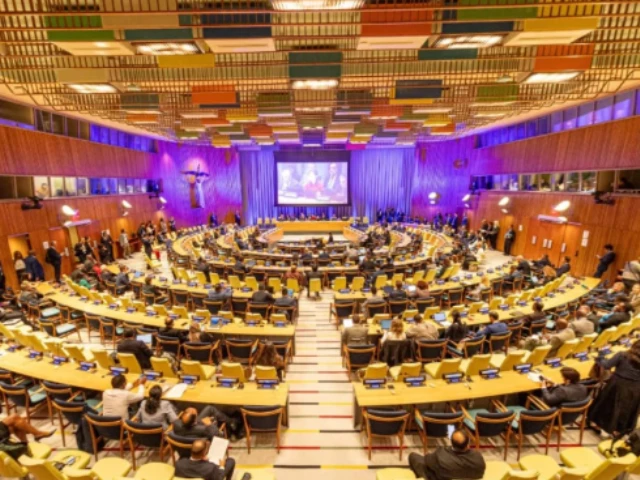Pakistan has strongly reprimanded India to the United Nations General Assembly, after an Indian diplomat derisively qualified the country as “terroristan”, in a deliberate attempt to slander Pakistan and to distract its own atrocities in the Jammu and the cashmere illegally occupied.
The representative of Islamabad described the remark as “completely shameful” and to qualify India a “author in series of terrorism”.
The confrontation took place during the general debate ongoing when the Indian diplomat Rétala Srinivas accused Pakistan of promoting terrorism, declaring: “No argument or counters can ever launder the crimes of terrorist”. Earlier in the session, the Indian Minister of External Affairs, Dr. S. Jaishankar, had also described Pakistan, without naming it directly, as “the epicenter of global terrorism”, citing the murder of tourists in Pahalgam as an example of “cross -border barbarism”.
By exercising his right of reply, Muhammad Rashid, the second secretary of the Pakistan mission to the UN, said that India’s attempt to distort the name of a sovereign state was unworthy and exposed its frustration. “By engaging in this type of rhetoric, India decreases its own credibility, showing the world that it has no substantive argument to offer, only inexpensive insults unworthy of a serious speech,” he told the 193 members’ assembly.
He added that India “tried to pollute the environment of the United Nations General Assembly (Unga) with baseless accusations”, “
Rashid argued that India itself was involved in sponsorship and support of terrorism abroad, citing Indian intelligence networks involved in sabotage and targeted murders. He referred to the capture of Commander Kulbhushan Jadhav, an Indian naval officer in service, as proof of clandestine operations from India to Pakistan.
He also accused New Delhi of “state terrorism” in Jammu-et-Cachemire of Indian illegal occupation, where he said that extrajudicial murders, arbitrary arrests and current meetings are routine.
Rejecting Jaishankar’s claims on Pahalgam’s attack, Rashid rejected the accusation of “cross -border barbarism” as a simple propaganda. He said Pakistan sentenced the United Nations Security Council (USC) and even offered an independent investigation, which India refused. “Not surprising that to date, no evidence linked to this incident has been shared,” he said.
Instead, he accused India of using the episode as a pretext for “blatant assault” against Pakistan between May 7 and 10, which killed 54 civilians, including 15 children and 13 women. Pakistan responded under article 51 of the United Nations Charter, targeting only military assets and dropping several Indian planes, he added.
Find out more: Security forces kill 17 terrorists in Lakki Marwat IBO: ISPR
While Jaishankar has urged the world community to smoke the financing of terrorism, to sanction the authors and to apply “incessant pressure” on those who adopt terrorism as a politician, Pakistan accused India of leading a secret campaign through attorney such as Balochistan Liberation Army (Bla) and its major brigade. Rashid said these groups had transformed places of worship, education and livelihoods into blood sampling sites.
Stressing Pakistan’s own sacrifices, Rashid said that more than 90,000 lives had been lost in his fight against terrorism, making it a recognized pillar in global efforts to combat terrorism. “More than 1.9 billion people from South Asia, a quarter of the world’s population, deserve prosperity and stability. But these objectives cannot be achieved through threats and intimidation,” he said.
“Real progress requires sincerity, mutual respect, dialogue and diplomacy – Pakistan practices have confirmed and that India must finally choose to adopt, if it really seeks peace.” He stressed that the desire for Pakistan dialogue remains firm but can only proceed according to dignity and respect, not mockery and slander.
Pakistan’s intelligence operation against Fitna al Khwarij
Seventeen terrorists were killed in an intelligence-based operation (IBO) in a volatile southern district of Khyber-Pakhtunkhwa, the army announced on Saturday, one day after Pakistan, China, Iran and Russia, a deep concern “concerning the continuous presence of terrorist groups in Afghanistan.
A cleaning operation is underway in the region, as the ISPR said: “The security forces are determined to destroy the threat of terrorism sponsored by the Indians of the country.”
Pakistan uses the term “Fitna al Khwarij” for Pakistan Tehreek-e-Taliban prohibited, an umbrella of terrorist groups responsible for a large part of terrorist violence in the country. The group found shelters safely through the border in Afghanistan following its rout in the military operation of Zarb-E-Azb in the old tribal areas in 2014.
Islamabad has repeatedly urged the Taliban regime to Kabul to fulfill its obligation under the Doha agreement and the law against TTP and other terrorist groups hostile in Pakistan. The Taliban regime, however, maintains the plausible denial, saying rather that the problem is through the border in Pakistan.
Read: Security forces kill 13 terrorists in Dera Ismail Khan Ibo: ISPR
No regional country or international organization is willing to buy the Taliban denial because growing evidence suggest that Afghanistan has once again become a magnet for transnational and international terrorist organizations after the capture of power by the Taliban in August 2021.
On Friday, four countries – Pakistan, China, Iran and Russia – warned that terrorist outfits based in Afghanistan, such as Eiil, Al -Qaida, TTP, the Balutchistan Liberation Army (Bla) and others, continue to threaten regional and global security.
The warning was made in a joint statement after their 4th quadrilateral meeting on Afghanistan held on the sidelines of the 80th session of the United Nations General Assembly in New York. The meeting, summoned to the invitation of Russia, brought together the foreign ministers of the four states to review the deterioration situation in Afghanistan.




